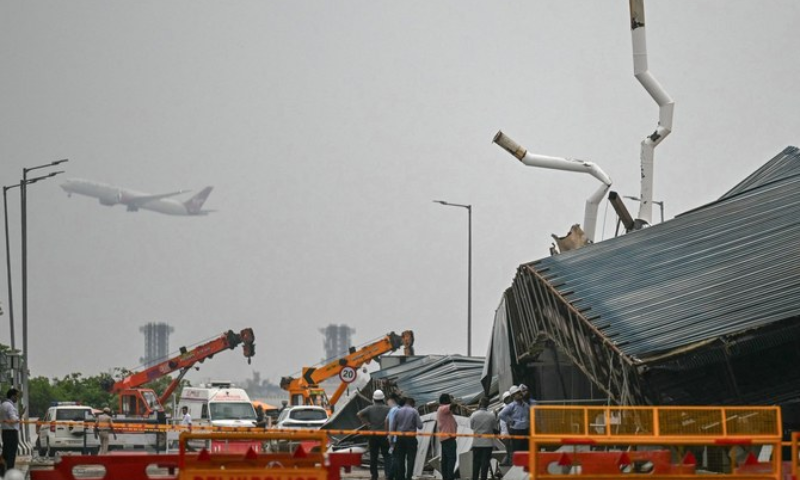NEW DELHI: The recent deadly roof collapse at New Delhi’s Indira Gandhi International Airport was the latest in a series of construction safety incidents in the country, prompting serious concerns over India’s multibillion-dollar infrastructure drive.
The incident occurred when a portion of canopy and pillars at Terminal 1 of the airport gave way following heavy rainfall on Friday morning. At least one person was killed and several others were injured in the incident. The incident prompted a temporary suspension of operations at the terminal, which handles domestic flights and affecting thousands of travelers.
This mishap is just the latest in a series of infrastructure failures across India, which have cast doubt on the quality and safety standards of major construction projects undertaken during Hindu-nationalist Prime Minister Narendra Modi’s tenure. Critics have pointed to issues such as the use of substandard materials, rushed project completions for political purposes, and inadequate maintenance post-construction.
Narayan Moorthy, a Delhi-based architect, attributed the incidents to a “slipshod work culture” and a “reckless hurry” to complete projects for political milestones. He emphasized, “This cocktail leads to disasters like the Delhi airport roof collapse and similar incidents across the country.”
Just a day prior to the Delhi accident, a canopy collapsed at Jabalpur airport in Rajasthan during heavy rains, while another incident saw a canopy fall at Rajkot airport in Gujarat. In addition, recent years have seen several bridge collapses in Bihar and waterlogging issues at an important underpass in Delhi.
Under Modi’s administration, India has witnessed an extensive infrastructure push with plans to operationalize about 44.4 trillion rupees ($532 billion) worth of new projects over the next two years, according to Bloomberg Economics. The government has touted achievements such as the construction of 80 new airports, railway upgrades, and the expansion of thousands of kilometers of highways.
However, these efforts have been marred by criticism from opposition leaders, including Mallikarjun Kharge of the Indian National Congress, who accused Modi’s government of corruption in the wake of the Delhi airport incident.
Niranjan Sahoo, a senior fellow at the Observer Research Foundation, pointed out that while the infrastructure development under Modi has aimed to meet the nation’s growing needs, there has been a notable lack of focus on maintenance and reliable auditing.
Prof. A.K. Gosain from the Indian Institute of Technology in Delhi highlighted the declining quality of construction and the absence of accountability at the highest levels as major factors contributing to infrastructure failures.
Anuj Srivastava, an architect and former Corps of Engineers member, expressed concerns about the rush in planning and execution of projects without adequate consideration for environmental impacts or long-term sustainability. He emphasized that such failures not only jeopardize safety but also damage India’s international reputation.
“Infrastructure disaster damages India’s reputation in the world. In the unseemly haste to build ‘world-class infrastructure’ in a hurry and its subsequent collapse, irreparable damage is being caused to India’s reputation,” Srivastava told Arab News.
























